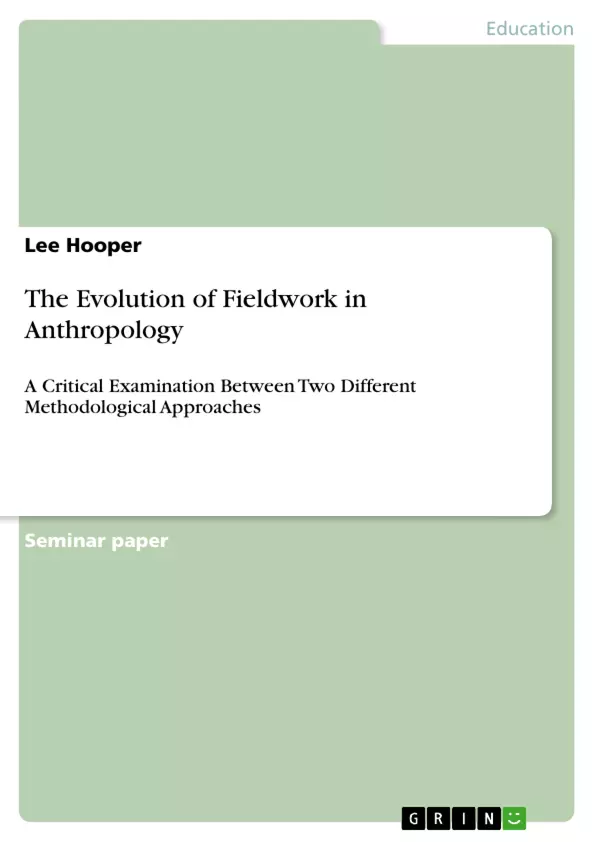The use of fieldwork is considered to be fundamental part of anthropological research, with many different methodologies being utilised depending on one’s theoretical stance. This essay will look to compare two different anthropologists’ approaches – that of Bronisław Malinowski’s (1922) work in New Guinea and Susan Krieger’s (1996) work in America. Through giving a general definition of fieldwork first, the two anthropologists’ methodologies will be outlined and contrasted. It is found that while there are certain similarities between both approaches, with each having their own distinctive strengths, the differences can be accounted for by historical environments and the goals of the anthropologist.
Inhaltsverzeichnis (Table of Contents)
- The Evolution of Fieldwork in Anthropology
- Definition of Fieldwork
- Malinowski's Approach
- Statistical Documentation
- Participant Observation
- Ethnographic Statements and Narratives
- Krieger's Approach
- Self-Assessment
- Reengagement Process
- Comparing the Two Approaches
Zielsetzung und Themenschwerpunkte (Objectives and Key Themes)
This essay examines the evolution of fieldwork in anthropology by comparing the methodologies of Bronisław Malinowski and Susan Krieger. The essay aims to provide a comprehensive understanding of the distinct approaches utilized by these anthropologists and analyze their respective strengths, limitations, and historical contexts. Key themes explored in the essay include:- The role of participant observation in anthropological research
- The influence of historical environments and socio-political contexts on anthropological methodologies
- The importance of scientific methods and data collection in fieldwork
- The impact of the ethnographer's personal biases and perspectives on research findings
- The relationship between personal identity, sexuality, and privacy in communities
Zusammenfassung der Kapitel (Chapter Summaries)
- The essay begins by defining fieldwork as a structured and qualitative research approach involving immersion into a society for gaining in-depth understanding.
- Malinowski's approach to fieldwork emphasized scientific methods, transparency, and grasping the "native's point of view." He proposed three avenues to achieve this: statistical documentation, participant observation, and collection of ethnographic statements and narratives.
- Krieger's approach recognized the unavoidable bias of the ethnographer and sought to explore its impact on research. She developed a method that investigated how her own feelings and prejudices affected her research while using an analytical approach.
- The essay then contrasts the two approaches, highlighting differences in their focus on scientific methods, self-reflection, and the scope of their attention to the community.
Schlüsselwörter (Keywords)
The key concepts explored in this essay include fieldwork, participant observation, ethnography, anthropological methodology, scientific methods, bias, self-reflection, personal identity, sexuality, and privacy. The work examines the evolution of fieldwork by comparing the approaches of Bronisław Malinowski and Susan Krieger, highlighting the significance of historical contexts and the impact of the ethnographer's own perspectives on research outcomes.Frequently Asked Questions
What is the definition of fieldwork in anthropology?
Fieldwork is a structured and qualitative research approach where an anthropologist immerses themselves into a society to gain an in-depth understanding of its culture and social structures.
How did Bronisław Malinowski contribute to anthropological methodology?
Malinowski emphasized scientific methods and transparency. He proposed three avenues for research: statistical documentation, participant observation, and the collection of ethnographic statements to grasp the "native's point of view."
What is participant observation?
Participant observation is a research method where the ethnographer lives within a community, participating in their daily activities to observe behaviors and social interactions from an internal perspective.
How does Susan Krieger’s approach differ from Malinowski’s?
Unlike Malinowski’s focus on objective scientific methods, Krieger recognized the unavoidable bias of the researcher. Her method involves self-assessment and exploring how her own feelings and identity impact the research findings.
What role does the ethnographer's personal identity play in fieldwork?
Personal identity, including factors like sexuality and personal history, can significantly influence how a researcher perceives a community and how that community interacts with them, as highlighted in Krieger’s work.
Why did the methodology of fieldwork evolve over time?
The evolution was driven by changes in historical environments, socio-political contexts, and the shifting goals of anthropologists, moving from strictly "scientific" observations to more self-reflective and analytical approaches.
- Citar trabajo
- Lee Hooper (Autor), 2012, The Evolution of Fieldwork in Anthropology, Múnich, GRIN Verlag, https://www.grin.com/document/262248



